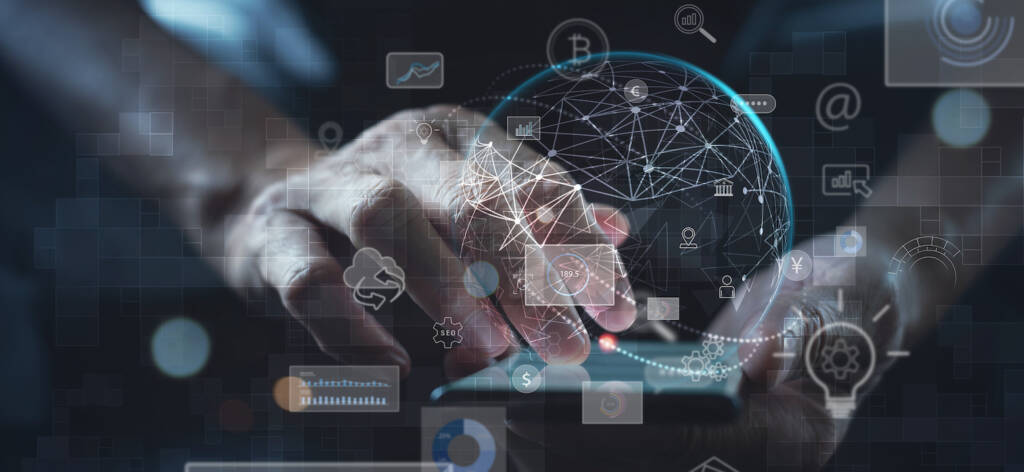Have you ever asked a chatbot a question about opening a savings account? Has your bank ever called you to verify account activity on your credit card? These are just a couple of ways artificial intelligence (AI) is quietly working behind the scenes to improve your banking experience. AI is booming, and it seems no industry has remained untouched by its impact and prevalence. Finance and banking are among the sectors discovering groundbreaking ways to harness the power of this game-changing technology.
This article explores what AI in finance means, its benefits, its impact on the industry and 15 examples of how it’s transforming financial services.
What Is Artificial Intelligence in Finance?
Artificial intelligence in finance refers to the use of advanced computational technologies — such as machine learning, natural language processing and data analytics — to automate, streamline and enhance financial processes. From fraud detection to personalized banking experiences, AI is transforming how financial institutions operate and interact with their customers.
What Are the Benefits of Utilizing AI in Finance?
AI offers numerous benefits to financial institutions and their customers, including:
- Improved efficiency: Automating routine tasks and decision-making processes saves time and resources.
- Fraud detection and prevention: AI analyzes transactional data to identify anomalies and protect against cyberattacks.
- Personalized customer service: Chatbots and virtual assistants provide 24/7 support tailored to individual customer needs.
- Improved decision making: Machine learning models process vast amounts of data to provide insights for better financial planning and investment strategies.
- Cost savings: AI-driven automation and predictive tools help financial institutions save billions annually.
How Does AI Impact the Finance Industry?
By harnessing the power of generative AI and machine learning, financial institutions are streamlining operations, enhancing security and delivering more personalized experiences to their customers. The impact is significant — McKinsey estimates that generative AI alone could contribute $200 billion to $340 billion annually to the global banking sector, largely through productivity gains. Citi adds that this innovation could increase global banking profits by $2 trillion by 2028, underscoring the immense potential of AI to redefine the industry.
One of the most immediate benefits of AI lies in fraud prevention. British multinational bank Barclays, for example, has deployed advanced AI systems that monitor transactions in real time, identifying and blocking fraudulent activity before it occurs. These same technologies are also driving customer engagement. Tools like Bank of America’s AI chatbot, Erica, have handled over 1.5 billion interactions, reducing wait times and improving customer satisfaction to levels once thought unattainable.
As digital banking continues to rise, so does the need for financial institutions to innovate. From automating tedious back-office tasks to delivering tailored financial advice, artificial intelligence in financial services is proving to be a catalyst for change, ensuring that banks not only meet but exceed the expectations of a tech-savvy generation.
15 Examples of How AI is Used in Finance
The use of artificial intelligence in financial services has streamlined processes, enhanced decision-making and improved customer experiences. Here are 15 real-world examples of AI in finance:
- Risk Assessment
Can you use artificial intelligence to determine whether someone is eligible for a loan? Definitely. In fact, banks and apps are using machine learning algorithms to not only determine a person’s loan eligibility but also provide personalized options, according to Towards Data Science. Tools like Zest AI exemplify this, offering solutions that analyze complex data while reducing bias, enabling financial institutions to make fairer and more accurate decisions. - Risk Management
Risk mitigation is always an important — yet ongoing challenge — in banking (and practically every other industry). Now, machine learning can help experts use data to “pinpoint trends, identify risks, conserve manpower and ensure better information for future planning,” according to Built In. For instance, platforms like AlphaSense enhance decision-making by providing actionable insights from vast amounts of financial data. - Fraud Detection, Management and Prevention
Have you ever received a phone call from your credit card company after you’ve made several purchases? Thanks to artificial intelligence, fraud detection systems analyze a person’s buying behavior and trigger an alert if something seems out of the ordinary or contradicts your traditional spending patterns. Tools like ThetaRay, an AI-powered financial crime detection platform, help banks and fintech companies prevent cyberattacks by monitoring transactions and screening customers. Similarly, as mentioned above, Barclays has implemented AI systems to monitor transactions in real time, helping prevent fraud before it occurs. - Credit Decisions
Towards Data Science explains that artificial intelligence can quickly and more accurately assess a potential customer based on a variety of factors, including smartphone data (plus, machines aren’t biased). Upstart is a leading platform in this area, leveraging AI to evaluate creditworthiness and provide accessible lending solutions. - Financial Advisory Services
Looking to follow the latest financial trends? Interested in a portfolio review? Artificial intelligence algorithms can analyze a person’s portfolio (or the latest trends or most relevant financial information) so that you can receive the information you need as quickly as possible, according to Forbes. Robo-advisors like PortfolioPilot use these insights to offer personalized, low-cost investment strategies. - Trading
Since artificial intelligence is used to analyze patterns within large data sets, it’s no surprise that it’s often used in trading. As Built In explains, AI-powered computers can sift through data faster than humans, expediting the entire process and saving large chunks of time. Platforms like Alpaca enable traders to analyze trends, identify opportunities and execute trades with precision. - Managing Finances/Personalized Banking
Chatbots and virtual assistants have reduced (and in some cases eliminated) the need to spend time on the phone waiting to speak with a customer service representative. Now, thanks to technology and AI, customers can check their balance, schedule payments, look up account activity, ask questions with a virtual assistant and receive personalized banking advice whenever it’s most convenient, according to Towards Data Science. Bank of America’s Erica is a standout example, handling over 1.5 billion interactions and redefining customer engagement. - Preventing Cyberattacks
Consumers want to be reassured that banks and financial institutions will keep their money and personal information as safe and secure as possible, and artificial intelligence can help. It’s estimated that more than two-thirds of data breaches are caused by human error. AI platforms like Darktrace use advanced algorithms to analyze data patterns, detect anomalies and stop potential cyber threats in real time. - Better Predict and Assess Loan Risks
As Forbes explains, artificial intelligence can analyze a customer’s spending patterns and actions, which can predict loan borrowing behavior. This is particularly useful in areas where traditional credit scores may not apply. For instance, Tala uses alternative data, such as smartphone usage, to assess credit risk and expand access to underserved populations. - Enabling 24/7 Customer Interactions
Thanks to artificial intelligence and the prevalence of virtual assistants and chatbots, customers can ask questions at all hours of the day (and night!) without waiting to speak with a person. AI-powered tools like boost.ai are designed to provide seamless, personalized customer support. - Reducing the Need for Repetitive Work/Process Automation
AI can automate repetitive, mundane, time-consuming tasks, such as reviewing documents or pulling information from applications. Platforms like UiPath take this to the next level, streamlining these tasks to free up employees for more strategic projects and innovation. - Reducing False Positives and Human Error
People make mistakes, and human error is an unfortunate reality. In the financial services industry, 94% of surveyed IT professionals said they aren’t confident that their employees, consultants and partners can safely protect customer data. AI platforms like Lucinity help reduce false positives by analyzing transaction patterns and flagging genuine risks, improving overall accuracy and reliability. - Ability to Execute Tasks of Any Length
Artificial intelligence has the ability to scale, meaning that you can use this type of advanced technology for short- or long-term projects. For instance, AI-powered platforms like DataRobot adapt to various use cases, from single-project analyses to ongoing data-driven decision-making processes, helping institutions save time and resources. - Making Smart Underwriting Decisions
AI solutions are helping banks and lenders “make smarter underwriting decisions” when it comes to the approval process for loans and credit cards, according to Built In. Rocket Mortgage demonstrates this by using AI to automate the underwriting process, ensuring compliance and speeding up approvals. - Save Money
Every item previously mentioned on this list can contribute to increased revenue. By automating tasks, you free up employees to take on additional responsibilities instead of hiring more personnel. Virtual assistants and 24/7 chatbots reduce operational costs, while tools like Betterment streamline financial planning for both businesses and customers, delivering cost savings on both ends.
Examples of Financial Firms That Are Using AI
According to Forbes, 54% of financial service organizations with 5,000+ employees are using artificial intelligence. Here are some examples:
- Capital One: “Eno” was the first natural language SMS text-based assistant offered by a bank in the United States.
- Bank of America: The chatbot “Erica” debuted in 2018 and has served more than 10 million users. As of mid-2019, Erica was able to understand almost 500,000 question variations.
- JPMorgan Chase: The bank uses key fraud detecting applications, including implementing an algorithm to detect fraud patterns, according to Business Insider. Details of credit card transactions are sent to data centers, which decide whether the transactions are fraudulent.
- Kensho: According to the company’s website, Kensho builds analytical products used by some of the world’s leading financial institutions, including Goldman Sachs, Bank of America, Merrill Lynch and JPMorgan Chase.
- Alphasense: This is “an AI-powered search engine for the finance industry … [serving] clients like banks, investment firms and Fortune 500 companies,” according to Built In. The platform uses natural language processing to analyze keyword searches and discover trends and changes in the markets.
Get Your Free Checklist: 8 Key Factors to Consider Before Choosing an AI Master’s Program (PDF)
Ethics in AI in the Finance Sector
Artificial intelligence does not come without some ethical challenges, especially when it comes to protecting your personal and financial information. The Fintech Times highlights three areas of concern when it comes to AI in the finance sector:
- Bias: AI failures can happen, and in many cases, it’s a problem with the algorithm. Here’s an example from The Fintech Times: “If an AI system calculating the creditworthiness of a customer is tasked to optimize profits, it could soon get into predatory behavior and look for people with low credit scores to sell subprime loans. This practice may be frowned upon by society and considered unethical, but the AI does not understand such nuances.”
- Accountability: Who is responsible if artificial intelligence makes an incorrect decision? For example, who should be at fault if a self-driving car gets into an accident?
- Transparency: How and why do algorithms come to particular conclusions? It’s not always easy to tell.
There’s also the idea often associated with artificial intelligence that robots will soon replace human workers. Forbes explains that while research shows that AI will replace certain categories of jobs, businesses and companies will be freed up to take care of other higher value responsibilities.
Another ethical concern, according to Investopedia, is the idea of “weaponized machinery” — whereby the use of artificial intelligence and machine learning tools are employed for unethical purposes, such as hacking into people’s private information.
The Future of AI in Finance
Since artificial intelligence has become more widespread across all industries, it’s no surprise that it is taking off within the world of finance, especially since COVID-19 has changed human interaction. By streamlining and consolidating tasks and analyzing data and information far faster than humans, AI has had a profound impact, and experts predict that it will save the banking industry about $1 trillion by 2030.
“Artificial intelligence technologies are increasingly integral to the world we live in, and banks need to deploy these technologies at scale to remain relevant,” according to McKinsey & Company. “Success requires a holistic transformation spanning multiple layers of the organization.”
It’s also important to note that millennials and “Gen Zers” are becoming the banks’ “largest addressable consumer group” in the United States, which means financial institutions are looking to increase their IT and AI budgets “to meet higher digital standards” since younger consumers often prefer digital banking. In fact, 78% of millennials say they won’t go to a bank if there’s an alternative.
AI in Finance Also Means New Career Opportunities
Artificial intelligence is transforming financial services, creating exciting new career opportunities for professionals who want to be at the forefront of innovation. The financial industry is seeking individuals with expertise in AI and machine learning to implement, operate and enhance cutting-edge systems. Here are some of the roles driving the future of AI in finance:
- AI Engineer: Develop AI systems that improve processes like fraud detection, algorithmic trading and customer personalization
- Machine Learning Specialist: Build predictive models for risk assessment, financial forecasting and market analysis
- Data Scientist: Analyze financial data to identify trends, optimize strategies and generate actionable insights
- AI Compliance Officer: Ensure AI systems comply with regulatory requirements and ethical guidelines
- Fintech Product Manager: Oversee the creation and implementation of AI-driven financial products tailored to consumer needs
- Fraud Analyst: Use AI-powered tools to detect, investigate and prevent financial crimes
- Quantitative Analyst: Leverage AI and advanced analytics to design and execute trading algorithms
- Ethical AI Specialist: Address concerns around bias, fairness and transparency in financial AI systems
The rise of AI in finance is reshaping the industry while creating opportunities for professionals across a wide range of disciplines. Whether you’re developing cutting-edge technology or ensuring it’s implemented responsibly, these careers allow you to contribute to the future of finance while advancing your own professional goals.
![Preview image of How Artificial Intelligence Is Used in Finance [+ 15 Examples]](https://onlinedegrees.sandiego.edu/wp-content/uploads/2022/01/USD_15-Examples-of-Artificial-Intelligence-in-Finance-1.jpg)


